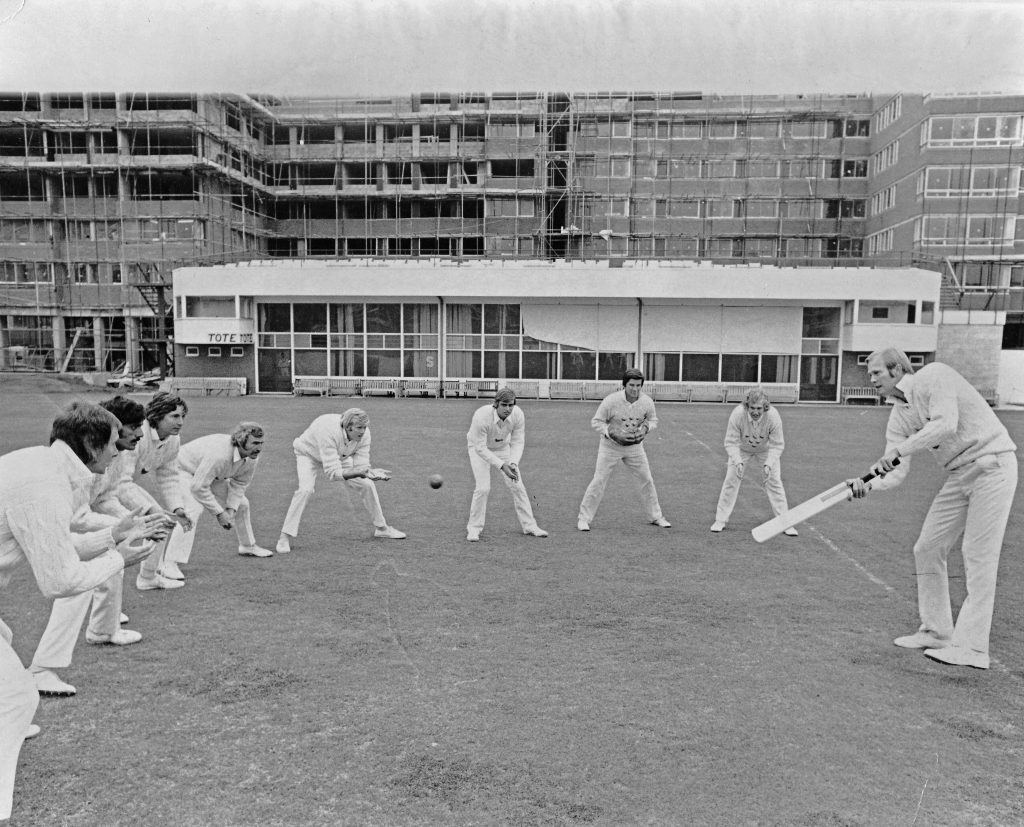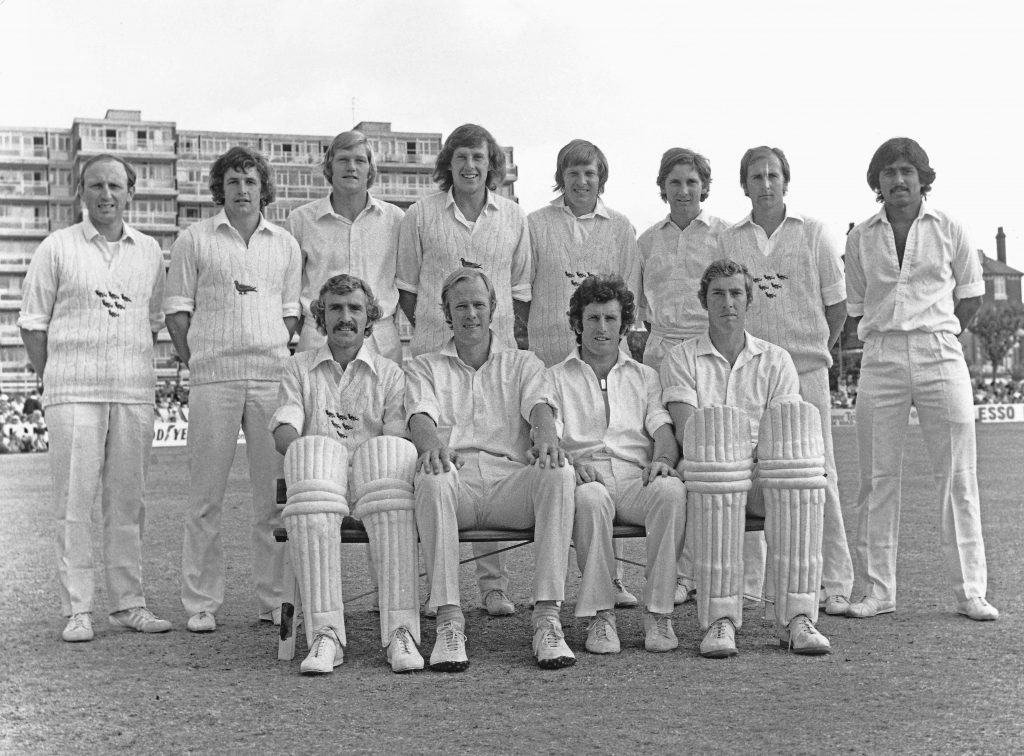On of the most influential figures in the game
Tony Greig was one of the most influential figures in English cricket in the 1970s although sadly his reputation has been affected by his involvement in the ‘Packer Affair’ in which he, together with Greg Chappell the former Australian Test captain, were seen as recruiting officers for Kerry Packer’s circus. Greig was though a vastly talented cricketer and from the moment he began playing for Sussex in July 1966, that was clearly apparent. Greig was captain of Sussex, and also of England from 1975 to 1977, playing for England by virtue of his father’s Scottish roots. His brother, Ian, also played for Sussex whilst several members of his extended family played at first-class level.

Discovered at Queen’s College
Greig was born in Queenstown, South Africa, on 6 October, 1946 to a Scottish immigrant father sent to South Africa during the war to train pilots, and a South African born mother. He was educated at Queen’s College, Queenstown and his cricketing talent was noticed by a number of former Sussex players who worked at Queen’s during the off-season. His first-class debut was for Border Province in the Currie Cup and soon after that at the age of 19, he was offered a trial at Sussex, having been recommended by Richard Langridge. His father gave him a year to see what he could do, and after he scored 156 at Hove against a Lancashire attack that included Brian Statham, Peter Lever and Ken Higgs, all England players in their day, his future was secured. Greig set himself a target of playing for England within six years although he returned to South Africa most winters.
At 6ft 8in and with fair hair and good looks, and with an engaging manner, Greig exuded charm and charisma. He was a genuine all-rounder who was a powerful hitter of the ball, and who bowled medium pace and off spin.
1,000 runs in his first season
In 1967, a year after his debut for Sussex, Greig took eight Gloucestershire wickets for 25 runs in July and at the end of his first season, still not yet 21, he had scored over 1,000 runs and taken 63 wickets in Championship matches, and 1294 runs and 65 wickets in all matches. The following seasons produced similar all-round performances and he was called up to play for England in the 1970 Test matches against the Rest of the World after the South African tour had been cancelled. He was not picked to play against India in 1971 and had to wait until 1972 to begin his real Test career. He played in all five matches against Australia and topped England’s batting averages as well as bowling well. From then on he became a fixture in England’s team, playing 58 consecutive Test matches between 1972 and 1977, captaining the side in 14 of these matches.

110 against Lillee and Thomson
His first three Test innings were all above 50, and by 1977 he had scored eight Test hundreds, including a marvellous 110 against Lillee and Thomson on an uneven pitch at Brisbane in 1974. His sum Test total was 3,599 runs and 141 wickets, which included 13 in one match against West Indies in Trinidad.
Captain of Sussex
Greig was appointed County Captain in 1974 and he continued to play for Sussex in Championship and One Day matches, enjoying particular success in 1975 when he scored nearly 1,700 runs in all matches and five hundreds for Sussex which included a huge 226 against Warwickshire at Hastings.
Greig had an excellent record as England captain, winning three and losing just four against mainly Australia and the West Indies at a time when these two sides dominated Test cricket. His performances once he began playing for England were often better than his record for Sussex. Whilst his Test batting average was over 40, his county average was no better than 28, and during his captaincy of Sussex nothing was won, and the side finished low down the table in all the years he was captain. The best season for Sussex under Greig’s captaincy was his last year, 1977, when the side finished eighth although he played in only twelve games.
A comfortable lifestyle
Greig had outgrown Sussex by the mid-1970s. He was captain of England, financially well-off and lived a very comfortable lifestyle. His involvement with the ‘Packer Circus’ led to charges of betrayal which resulted in his dismissal as England captain and his replacement as Sussex captain and his being released from his contract midway through the 1978 season.

An affectionate gesture
In an affectionate gesture, Greig presented Sussex CCC with his England blazer from the 1974/75 tour of Australia and New Zealand, when England came up against the bowling of Lillee and Thomson in their prime. Most English batsmen struggled in the First Test but Greig played a dogged innings of 110 in the first innings. The blazer is now on display in the Sussex Cricket Museum.
That summer of 1975, the year of the World Cup, England under Mike Denness reached the semi-final, losing to Australia. Greig’s aggressive batting and bowling, seemed to be ideally suited to the One Day game but in his 22 ODIs, there were few outstanding performances. With England losing the winter Test series in Australia by four Tests to one and then losing the First Test against Australia the following summer, Denness was sacked and replaced by Greig.
Greig started off well, getting the better of Australia in a draw at Headingley with Greig scoring 96 and 41 but with England poised for victory at Headingly, the pitch was destroyed by vandals and the game had to be abandoned with the Ashes retained by Australia. Greig headed off to Australia for the winter to play grade cricket and during his time there signed a number of endorsements, including commercials for breakfast cereals.

In the lead up to the summer series of 1976 against the West Indies Greig made a number of ill-judged remarks which fired up the West Indian bowlers and he did not have a good series scoring just 243 runs in nine innings in a 3:0 loss.
His best performance?
His best period as captain was when England toured India in 1976/77. England were clear underdogs but won the first three Tests by clear margins. Perhaps Greig’s best performance was his score of 103 on a broken pitch in Calcutta in front of 100,000 fans and whilst suffering from a stomach bug.
Following a brief break in Sri Lanka, Greig took his team to Australia to play in the Anniversary Test in Melbourne. The English team played in an aggressive style and in a tight game that went to the wire on the last day, Australia emerged the victors by 45 runs, the same margin as the first ever Test.
The ‘Packer Affair’
Unbeknown to everyone in England who welcomed Greig and his team from a long but successful tour, he had signed a contract with Kerry Packer, the owner of Nine Network, to sign up a number of players for a cricket series to be played in Australia. The Australians were in England in 1977 and one of their first matches was to play a Sussex team led by Greig on May 7-10. The match was ruined by bad weather but at a party at Greig’s house in Brighton, two Australian journalists discovered the secret signings and the news was made public. Greig was taken aback by the level of criticism and the vitriolic response to Packer. Within a week he was removed as England captain but continued to play for England that summer although his appearances were accompanied by jeering. Greig made 91 in the first Test and played his part in the defeat of the Australians in the series and the reclaiming of the Ashes. Brearley, the captain persuaded the selectors to select Greig for the last Test at the Oval and he bowed out of Test cricket at the Oval on August 30, 1977. The Super-Test final of the 1978/79 season was his final game of cricket in any format and though he promised his audience he would get 100, his missed his targets by just 100 runs as he was caught behind off the bowling of his long-time rival Dennis Lillee.
Greig was one of England’s leading international all-rounders. He compares well with some of the great all-rounders of his era. He averaged 40 with the bat in Tests and 32 with the ball compared with Botham’s 33 with the bat and 28 with the ball, and J. Kallis’ 55 with the bat and 32 with the ball. He was an inspirational captain, leading from the front and was capable of adapting his batting and bowling to suit the conditions. What was not known about him at the time was that he was a long term epileptic and it would have taken a lot of courage and determination to master this disability and play in the way that he did. Greig became a highly regarded commentator after he retired from the international game and later emigrated to Australia. He was diagnosed with lung-cancer in October 2012, dying on 29 December at the age of 66 from a heart attack. His obituary was the last published article by Christopher Jenkins.